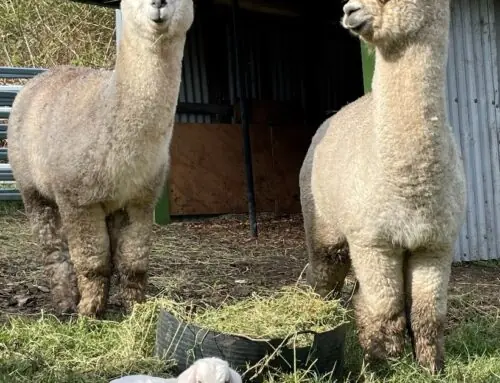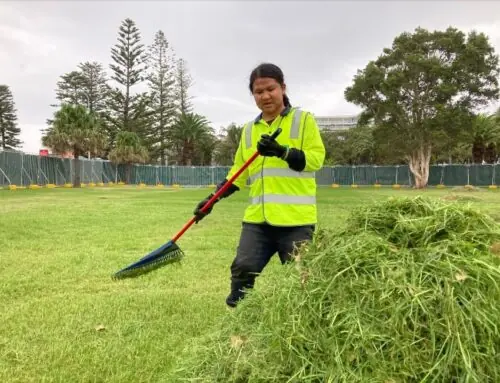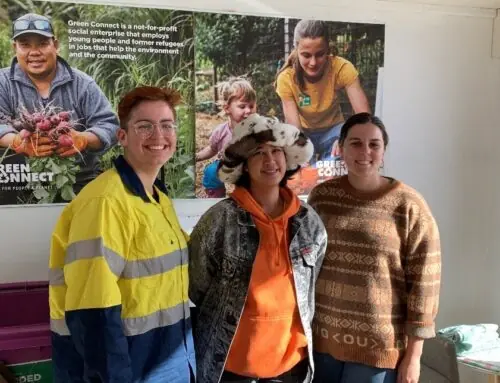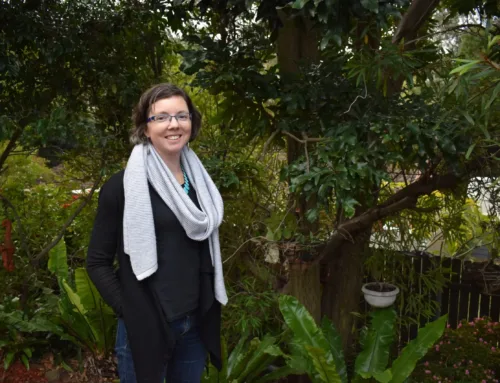
Trekking through the market garden of the Green Connect farm, we approach Shay Reh as he gracefully harvests leafy greens using only a kitchen knife. He welcomes us with a kind smile but explains that he is nervous about our interview and speaking in English; it doesn’t take him long to relax, though.
Shay Reh’s face lights up as he explains how, after arriving in Sydney from Burma (the Karenni state) in 2011 as a refugee, he was awe–struck by the city. Describing this new landscape, he says, “I had never seen so many bright lights or cars on the road… It was very exciting for me”. He explains to us that the refugee camp he grew up in was in an isolated part of the jungle. He tells us that although there was a small river nearby, the refugees were not permitted to leave the camp for any reason. His eyes are briefly downcast as he elaborates that, “I never learnt to swim, so I don’t visit the beach here in Australia.”
Despite already knowing two languages – Karenni and Burmese; learning English was a daunting hurdle for Shay Reh to tackle when he first arrived in Australia. Luckily, he was connected to English classes at TAFE through SCARF (a wonderful organisation supporting refugee families in the Illawarra that Green Connect is proud to collaborate with). After being referred to Green Connect through a mutual contact at SCARF, Shay Reh joined the team and has now been with us for around 5 years. Speaking about his experience working on the farm, he says that “Green Connect is great for refugees and Karenni people because we can do anything; It’s very hard for us to speak a new language but Green Connect gave us a job. That means everything to us”. He adds that the other staff at Green Connect (like Cal, Bron, Ann) are “good people”. To Shay Reh, this means that “we are treated like a big family and everyone is very understanding with people’s language barriers and are not judgmental.”
Asking whether Shay Reh was involved in the construction of the Karenni-style bamboo fence that was recently built on the farm, we learn that working on it brought back old memories of the refugee camp and being taught the methods by his neighbors and other members of the community. He surprises us by saying that he grew up with the other Senior Farm Hands, Eh Moo and Su Meh, in the refugee camp. Eh Moo has been his best friend since they were children, and Su Meh is one of his sisters. Before his father gave up everything to fight the Burmese, Shay Reh’s parents were farmers. Once they moved to the camp, however, there was no work for anyone.
The whole family are now in Australia – Shae, his parents, his siblings and his wife and children – all living together in the same home. Pare Mo, Shay’s wife, also works at the farm. They met in the refugee camp and now have four children, two of whom were born here. Shay Reh says “I probably know 80% of the other Karenni at Green Connect from the refugee camp I grew up in”. He beams as he tells us this; it makes him incredibly happy to get to work with people he has known his entire life, in a new country and living a better life than the one they once knew. He admits that although Karenni and Australian cultures are very different, it’s not a big concern for Shae Reh and he considers himself lucky to be here. He cautiously admits that although Wollongong is an incredibly beautiful place, he can’t believe how expensive necessities like food and rent are.
He says that although he has many hopes and dreams for the future, it was too difficult for him to explain them to us in English. Despite our language barriers, however, it is clear from our brief conversation that Shay Reh is a warm, intelligent and hard–working person with a big heart, a bright future and a strong sense of community







Leave A Comment
You must be logged in to post a comment.